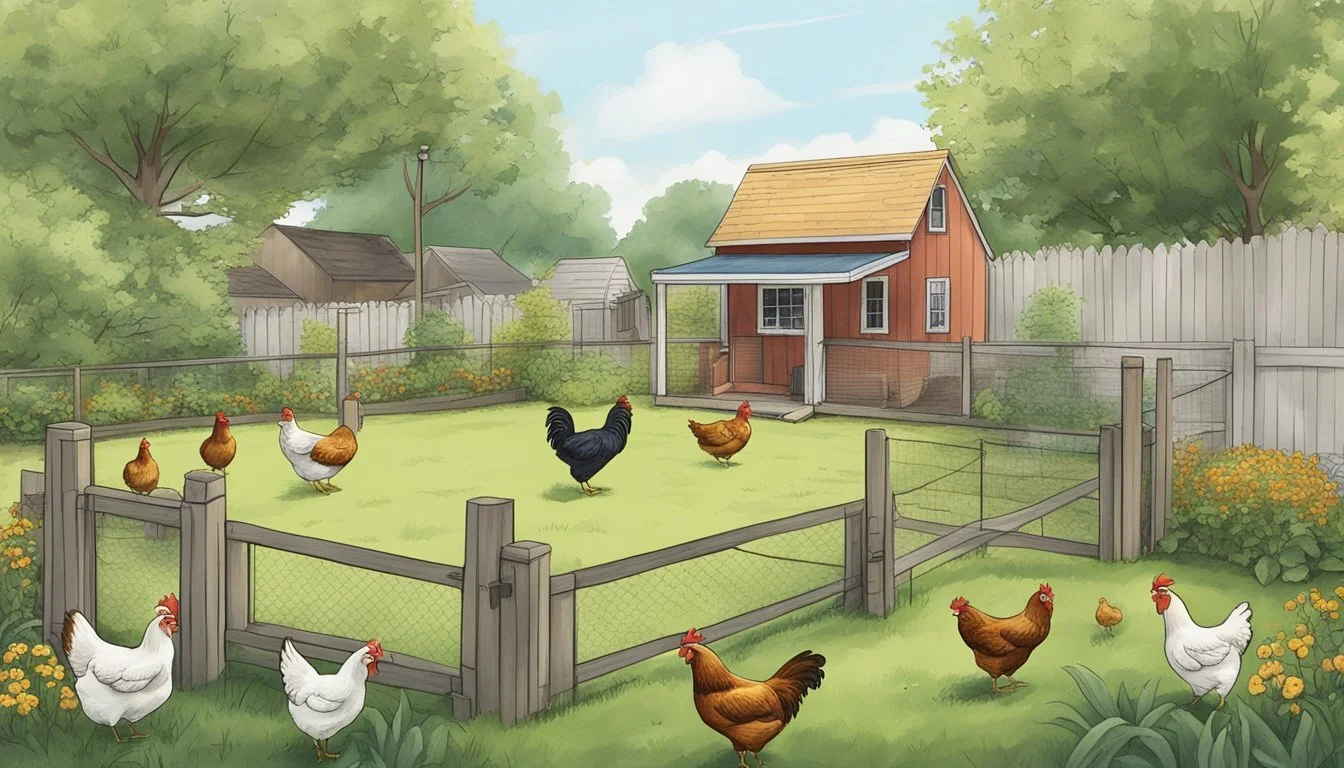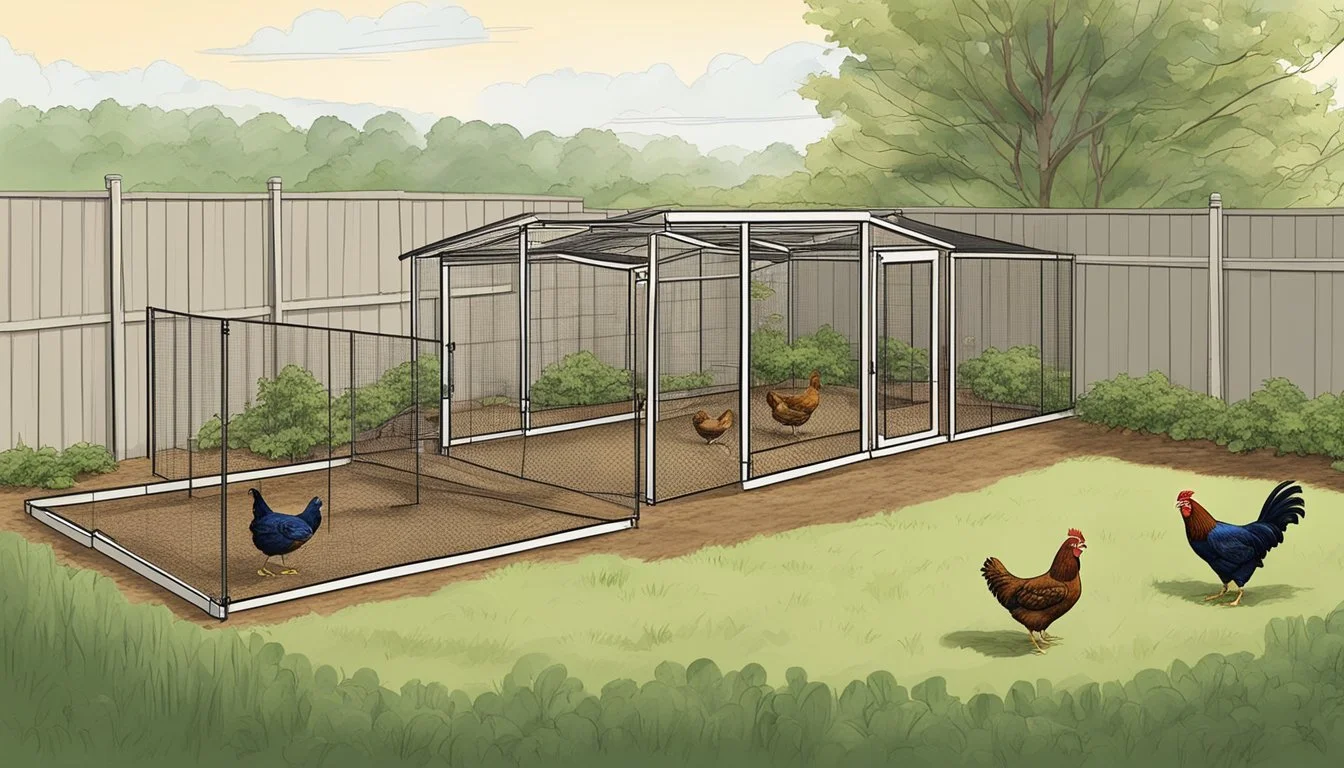Raising Backyard Chickens in Frederick, MD
A Starter Guide for Urban Poultry Enthusiasts
Raising backyard chickens has become an increasingly popular hobby for residents of Frederick, Maryland, who are looking to embrace a more self-sustained lifestyle, gain access to fresh eggs, and engage in a rewarding pastime. The town of Frederick provides a supportive environment for those interested in small-scale, backyard poultry farming, making it an inviting location for both experienced and novice chicken keepers.
In Frederick, the specifics of keeping backyard chickens are governed by local laws that ensure the practice is done in a manner that is considerate to both the animals and the community. These regulations address important factors such as property lot size, types of chickens permitted, as well as coop and run requirements. These rules are in place to balance the desires of chicken enthusiasts with the rights and concerns of other residents.
Marylanders in Frederick looking to keep chickens must adhere to certain requirements; for example, only female chickens, or hens, are allowed to be kept, while roosters are prohibited within certain limits of the town due to noise concerns. Additionally, the local ordinances dictate the minimum lot size required for raising chickens, restrictions on the number of chickens based on property size, and the specifications for the placement and construction of chicken coops and runs. By following these guidelines, residents can responsibly enjoy the benefits of raising backyard chickens.
Understanding Local Chicken Ordinances in Frederick
Before starting a backyard flock, Frederick residents must familiarize themselves with specific local laws to ensure compliance. This includes understanding the ordinances, permit requirements, property considerations, and limits on the number of chickens allowed.
Overview of Frederick Chicken Laws
In Frederick County, Maryland, local zoning ordinances outline the regulations for keeping chickens. These laws are designed to maintain public health and safety while allowing residents to raise chickens for personal use.
Zoning Ordinances: §§ 1-19-11.100, 1-19-8.325, and 1-19-3.210.
Prohibited Animals: For instance, roosters are not allowed within certain residential areas to mitigate noise issues.
Permit Requirements and Fees
To raise chickens legally, city residents may need to obtain a permit.
Permit: Registration or a license might be necessary, depending on the number of chickens and the specific local law.
Fee: If a permit is required, there will typically be an associated fee, which can vary. Residents should check with the local zoning office for exact costs.
Lot Size and Property Line Considerations
Frederick's chicken ordinances take into account the size of the property and its proximity to neighbors.
Minimum Lot Size: 2,500 square feet is required to keep chickens.
Property Lines: Coops and runs must be situated a specific distance from property lines, which is detailed in the respective zoning ordinance.
Maximum Number of Chickens Allowed
There are clear limits to how many chickens one can keep on their property.
Chickens Allowed: The exact number may vary based on the size of the lot and zoning category. Residents should refer to the ordinance for detailed restrictions.
Setting Up Your Chicken Coop
When establishing a chicken coop for a backyard flock in Frederick, MD, it is essential to consider design, safety, essential features, and optimal placement within your property.
Choosing the Right Coop Design
The ideal coop design accommodates four to ten square feet per chicken, providing enough space to roam, scratch, and roost. A well-designed coop offers ventilation, insulation, and accessibility for both chickens and their owners. It is imperative to select a design that aligns with Frederick's local ordinances to ensure compliance.
Important Coop Features for Safety and Comfort
A coop must prioritize chicken safety and comfort. This includes sturdy construction materials to deter predators and a design that allows for easy cleaning and maintenance. Coops should include:
Ventilation: Ample air circulation without creating drafts.
Insulation: Protection against Maryland's seasonal temperature changes.
Roosting Bars: Adequate space for each chicken to roost comfortably.
Nesting Boxes: At least one box for every three to four hens.
Optimal Placement of Chicken Coops and Runs
Position the coop and attached run in the backyard at least ten feet away from property lines. Ensure the location provides:
Sunlight: Direct exposure for warmth and prevention of mold and mildew.
Shade: Areas of relief during the hotter months to prevent overheating.
Drainage: A coop and run on high ground to prevent water accumulation.
Chicken Breeds Suitable for Frederick's Climate
In Frederick, Maryland, backyard chicken enthusiasts have the advantage of raising a variety of breeds that are well-adapted to the local climate. The area experiences four distinct seasons, including hot summers and cold winters, which necessitates choosing breeds that can thrive in these conditions.
Wyandottes are a top choice for their resilience in cold weather, thanks to their thick feathering. This breed boasts a walnut comb, less susceptible to frostbite during frigid temperatures. Their calm demeanor and steady egg-laying make them a practical addition to local henhouses.
Cochins have a reputation for fearlessness against the cold. They are heavily feathered, including on their feet and legs, providing extra insulation during winter. These hens and roosters contribute a gentle presence to a backyard setting, although they may not be the most prolific layers.
Ameraucanas are also suited for Frederick's varying climate. Known for their distinctive blue eggs and excellent winter laying, they have adapted well to Maryland's seasonal shifts. These chickens bring a unique flair to any flock with their puffy cheek feathers.
Listed below are the chicken breeds known for their adaptability to Frederick's weather:
Wyandottes: Durable and cold-resistant with a calm temperament.
Cochins: Good cold weather tolerance, friendly, but lay fewer eggs.
Ameraucanas: Known for blue eggs and good performance in cold weather.
Backyard chicken keepers in Frederick County, MD, should consider these breeds for a healthy flock throughout the year.
Health and Wellness of Your Chickens
Raising chickens in Frederick, MD requires attentive care with a focus on preventive health strategies, prompt disease treatment, and effective waste management to ensure poultry wellness.
Preventative Care and Regular Health Checks
Preventative care for chickens encompasses regular health examinations, vaccinations appropriate for the area, and parasite control. Owners should routinely check their chickens for signs of illness, such as changes in behavior, appetite, or egg production. A schedule for deworming and external parasite treatment, tailored to the farm's specific needs, is crucial.
Vaccinations: Should be administered as per your veterinarian's recommendations.
Parasite control: Includes regular inspections and treatments for lice, mites, and worms.
Common Diseases and Treatment
Chickens in Frederick are susceptible to a range of diseases. Rapid identification and treatment are key.
Respiratory Illnesses: Symptoms often include coughing, sneezing, and nasal discharge. Treatment may consist of antibiotics and supportive care.
Fowl Pox: Characterized by lesions on the skin and around the beak. Vaccines are available for prevention.
Marek’s Disease: A viral disease causing tumors and paralysis, for which there is no treatment but prevention is possible through vaccination.
Note: Always consult with a veterinarian for an accurate diagnosis and treatment plan. Administer all medications according to the vet's instructions.
Benefits of Composting Chicken Waste
Composting chicken waste provides a dual benefit: reducing farm waste and creating nutrient-rich compost for gardens:
Nutrient content: Chicken waste is high in nitrogen, phosphorus, and potassium.
Composting process: Properly managed composting minimizes odors and accelerates decomposition, resulting in a useful fertilizer.
Composting Steps:
Collect waste and bedding.
Create a compost pile, alternating brown and green layers.
Regularly turn the pile to aerate and ensure even decomposition.
By integrating comprehensive health checks, disease management, and efficient composting practices, owners can maintain the wellness of their backyard chickens in Frederick, MD, while contributing to sustainable farming practices.
Feeding and Nutrition for Optimal Egg Production
Proper nutrition is critical for a backyard flock in Frederick, MD, to ensure robust health and consistent egg production. Owners should focus on a diet that provides a balance of proteins, vitamins, essential fats, and minerals.
Starter Feeds: A laying hen's diet should begin with a high-quality commercial feed. For the initial stage, breeders recommend formulations that contain about 16-18% protein to support early growth and development.
Protein: As hens mature, their dietary protein needs decrease slightly. Feed specifically designed for laying hens usually has about 15-17% protein, sufficient for egg production.
Vitamins and Minerals:
Vitamin A and Vitamin D3 are essential for bone health and eggshell quality.
Vitamin E and B12 support overall well-being and egg quality.
Copper sulfate and phosphorus benefit shell integrity.
To support digestion and nutrient uptake, the feed should also include fiber and enzymes.
Grains and Grit: In addition to commercial feeds, offering grains can provide energy, but should not exceed 10-20% of the diet. Grit is also important for digestion, as chickens do not have teeth to break down food.
Calcium: Eggshell formation requires calcium, which can be supplied by oyster shells or a similar calcium source.
Clean Water: Always ensure clean, fresh water is available, as dehydration can affect egg production and health.
Remember that consistency in feeding is key for a backyard flock in Frederick, MD. Sudden changes in the diet can stress chickens, leading to decreased egg production or health issues.
Daily and Seasonal Chicken Care Routines
When it comes to daily care of backyard chickens in Frederick, Maryland, a diligent routine greatly contributes to their health and productivity. They require proper feeding, access to fresh water, and a secure coop for protection and egg laying.
Morning:
Feed and Water: Chickens should be given feed appropriate for their age and purpose (egg-laying or meat). They must always have access to fresh water.
Coop Inspection: A daily check of the coop ensures it is clean, ventilated, and secure from predators.
Afternoon:
Egg Collection: Collect eggs to ensure freshness and to discourage egg-eating habits.
Health Check: Observing the chickens for any signs of disease or distress is crucial for early intervention.
Evening:
Secure the Coop: After chickens roost, closing coop doors protects them from nocturnal predators.
Seasonal care varies with changes in weather, requiring adjustments to maintain their health and comfort.
Summer:
Ventilation and Shade: To prevent overheating and ensure comfort.
Pest Control: Protect chickens from parasites and diseases.
Winter:
Coop Insulation: Protection against the cold while avoiding drafts.
Water: Prevent freezing with heated water dispensers.
Fall and Spring:
Molt Management: Extra protein in their diet helps chickens recover from molting.
Cleaning: Seasonal deep cleaning of the coop prepares for temperature extremes.
Consistent care throughout the year ensures a healthy flock that can provide a steady supply of eggs and maintain the joy of raising chickens.
Community Engagement and Legal Compliance
Raising backyard chickens in Frederick, MD requires residents to navigate a set of laws and regulations while keeping the peace with neighbors. Community involvement, especially through local 4-H clubs, enhances educational opportunities and breeds responsible husbandry practices. Now, let's further explore the steps to comply with local laws and maintain good relations in the community.
Keeping Neighbors Happy and Informed
Residents are encouraged to inform their neighbors of their intention to raise chickens. This creates a transparent environment and allows for addressing any concerns proactively. For instance, ensuring that coops are kept clean to minimize odors will be a good neighborly practice. Accordingly, Frederick County mandates that coops must be located at least ten feet from any property line.
Participating in Local 4-H Clubs and Shows
Involvement in 4-H clubs provides youth with the opportunity to learn about animal care and participate in shows. This also fosters a community that respects and adheres to animal husbandry standards. Participation in 4-H activities can occur across various jurisdictions, including Baltimore County, Montgomery County, areas like Rockville, Silver Spring, Bethesda, and Potomac. These programs empower young individuals with the knowledge required to raise chickens responsibly.
Understanding Zoning and State Regulations
Zoning and state regulations must be closely followed to ensure legal compliance. Frederick County's Zoning Ordinance specifies the conditions under which chickens can be kept, including lot sizes and coop specifications.
Minimum Space Requirements: The coop must provide four to ten square feet per chicken.
Location: The coop must be situated in the backyard, maintaining a minimum distance of ten feet from property lines.
Waste Management: Proper composting or disposal of chicken manure is required.
Residents must understand that these rules are subject to change; therefore, consistent engagement with county and city regulations is imperative to remain compliant. Additionally, the Maryland State Law under the Agriculture Section 3-804 requires checking local ordinances regarding the keeping of chickens.
Beyond Chickens: Ducks, Turkeys, and Other Poultry
Expanding a backyard flock in Frederick, MD to include birds beyond chickens like ducks, turkeys, and other poultry can offer new opportunities for poultry enthusiasts. Each type of bird brings its own unique requirements and benefits to a homestead.
Ducks, for instance, are generally hardy and get along well with chickens. They require access to water for bathing, not just drinking, and thrive in an environment where they have ample space to forage and roam. Their eggs are larger and have a richer flavor compared to chicken eggs. A proper enclosure that protects them from predators is essential.
Poultry Type Space Requirements Special Needs Egg Production Ducks Ample roaming area Water source for bathing Frequent layers; large eggs Turkeys Large range space More vertical space Seasonal layers
Turkeys demand more space than chickens and ducks, as they are larger birds. They need sturdy roosting areas and are also more susceptible to certain diseases, so biosecurity measures are crucial.
In a small flock setting, other poultry can coexist with backyard chickens, but it's important to manage the space well to prevent overcrowding and stress amongst the birds. Prospective poultry keepers should also be aware that Frederick County mandates registering one's flock with the Maryland Department of Agriculture and adhering to local zoning laws.
Raising a variety of poultry can enrich a homestead with different types of meat and eggs, as well as the enjoyment of observing a diverse flock. However, it's important to plan for the specific needs of each species to ensure a healthy and harmonious backyard environment.
Raising Chickens as Pets and for Fun
Raising chickens in a Frederick, MD backyard can be a delightful experience for families or individuals seeking pets with personality and the added bonus of home-laid eggs. Chickens can offer companionship, reduce garden pests, and provide organic fertilization. They are intelligent and entertaining creatures that can be a source of joy for owners of all ages.
When beginning, selecting the breed is crucial. A variety of chickens display different temperaments, with some breeds more suitable for close interaction, making them ideal as pets. The Silkies and Orpingtons, for example, are known for their docile nature and ease of handling.
Cost Considerations
Chicks: $3 - $10 each
Adult Chickens: $10 - $50
Basic Coop: Around $500
DIY Coop: $800 - $1000 including materials and labor
For the chickens’ living quarters, it’s recommended to provide at least 3 square feet of coop space per adult chicken and 10 square feet of run space. Materials should be sturdy, with strong chicken wire or hardware cloth to protect against predators.
Essentials for Raising Pet Chickens:
Housing: Coop and run
Feeding: Proper nutritional feed for different growth stages
Health: Regular checkups and vaccinations
Engagement: Social interaction and environmental enrichment
While the cost and commitment should not be underestimated, the process is straightforward with proper planning. Backyard chickens are a commitment similar to any other pet, but the rewards are substantial in the form of fresh eggs, natural pest control, and an engaging hobby that connects one to the cycle of nature and animal care.











